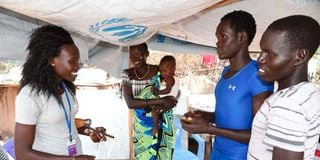Premium
Here is the Tokyo 2020 Refugee Olympic Team

Refugee athlete Rose Nathie (left), her mother Verenika Nakitizi, her brother Tom Namilo and Simon Lokonyen, their relative, at their home in Kakuma Refugee camp in Turkana County on June 15, 2019.
What you need to know:
Tokyo 2020 Games, Tokyo Olympics, Tokyo 2020, Refugee Olympic Team,Guor Marial, International Olympic Committee,IOC,Thomas Bach,2016 Olympics,Kimia Alizadeh,Hamoon Derafshipour,
Lausanne, Switzerland
The Tokyo 2020 Games will see 29 displaced athletes living in 14 countries around the world compete as part of the Refugee Olympic Team. The squad arrives in Japan on Wednesday.
Here is a look at the history of the team, its debut at the 2016 Games, its growing place in the Olympic movement and the path towards Tokyo 2020:
Creation
Marathon runner Guor Marial, a refugee living in the United States, competed at London 2012 as an independent athlete, having made the qualifying time. He had escaped Sudan, was not a US national and his newly-independent South Sudan homeland did not yet have an Olympic committee.
Following a global refugee crisis that saw millions of people displaced around the world, International Olympic Committee (IOC) president Thomas Bach announced the creation of the new team at the United Nations General Assembly in October 2015.
It first took part in the Rio de Janeiro 2016 Olympics.
Prospective competitors are supported by scholarships. Some $2 million has been invested in refugee athletes since Rio.
The team's performance in Rio triggered the launch in 2017 of the Olympic Refuge Foundation. It aims to provide one million young people affected by displacement with access to sport by 2024.
Flag and anthem
The athletes compete under the Olympic flag. If any medals are won, the flag will be raised and the Olympic Anthem played.
The team's IOC code, EOR, comes from the French acronym Equipe Olympique des Refugies.
The team will be the second to enter the Tokyo opening ceremony parade of nations, following traditional first entrants Greece.
Rio 2016
Ten athletes took part: five originally from South Sudan, two each originally from Syria and the Democratic Republic of Congo, and one from Ethiopia.
Six competed in athletics, two in swimming and two in judo.
800 metres runner Rose Lokonyen, who fled on foot from South Sudan to Kenya aged 10, carried the flag at the opening ceremony.
Judoka Popole Misenga, who escaped the DR Congo and sought asylum in Brazil, did so at the closing ceremony.
Tokyo 2020
Some 56 athletes were supported by the IOC scholarships, of which 29 were chosen to compete in Tokyo. The selection criteria was based on sporting performance and their refugee status being confirmed by the UN Refugee Agency.
Personal background, as well as a balance of sports disciplines, gender and regions were also taken into account.
The 29 athletes include nine originally from Syria, five originally from Iran, four originally from South Sudan and three originally from Afghanistan. They will compete in 12 sports.
Six competitors from 2016 are returning for Tokyo, including Lokonyen and Misenga.
Also returning is 23-year-old Syrian swimmer Yusra Mardini, who competed in Rio less than a year after she and her sister Sarah used their swimming skills to pull to safety their water-logged boat carrying another 18 migrants and refugees from Turkey to Lesbos.
The team includes some decorated athletes.
Kimia Alizadeh, who defected from Iran to Germany last year, won a bronze medal in Rio in taekwondo.
Javad Mahjoub, a judoka who fled Iran and is now a refugee in Canada, won gold at the 2013 Asian Judo Championships.
Hamoon Derafshipour, also originally from Iran but now in Canada, won bronze at the 2018 World Karate Championships.
The delegation includes 20 coaches and 15 team officials. Travel and participation expenses are covered.
They will stay in the Olympic Village, just like any other team.
Quotes
- IOC president Thomas Bach
Bach told the Tokyo team they "will send a powerful message of solidarity, resilience and hope to the world. You are an integral part of our Olympic community, and we welcome you with open arms."
- UN Refugee Agency chief Filippo Grandi
"Surviving war, persecution and the anxiety of exile already makes them extraordinary people, but the fact that they now also excel as athletes on the world stage fills me with immense pride. It shows what is possible when refugees are given the opportunity to make the most of their potential."





